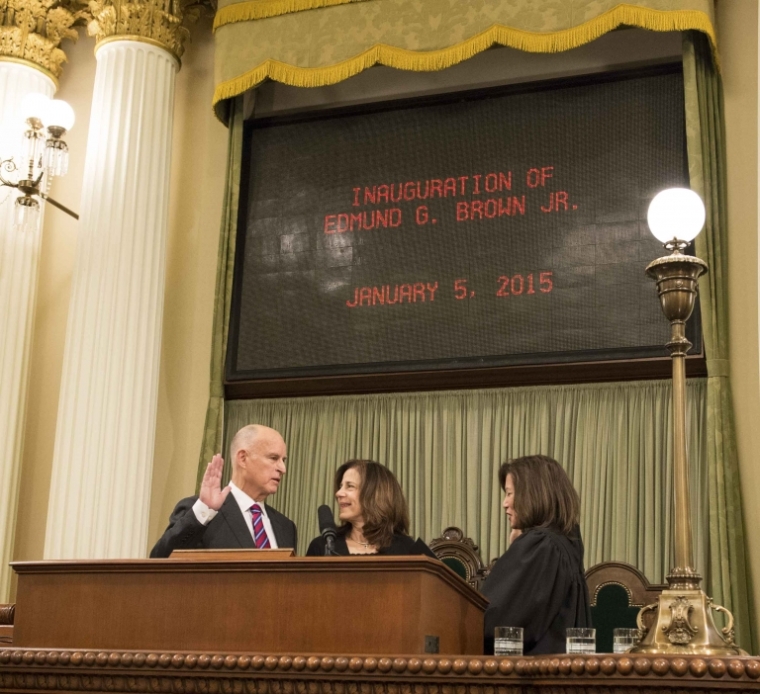Jerry Brown Sworn In for Record 4th Term As California Governor

Jerry Brown took his oath of office for a record fourth term as California governor Monday and laid down his plans in the next four years to tackle problems the state has been experiencing, including education, health care, crime and environmental woes.
"To that end, over the next four years - and beyond - we must dedicate ourselves to making what we have done work, to seeing that the massive changes in education, health care and public safety are actually carried out and endure," he said in his inauguration speech made at the California state assembly.
Brown, the first governor in California's history to serve four terms, touted that compared to four years ago, the state budget is now balanced from $26 billion in debt coupled with a 12.1 percent unemployment.
This, he said, was done through a cut in spending, growing economy and "people voting for temporary taxes."
"Soon we will make the last payment on the $15 billion of borrowing made to cover budget deficits dating back to 2002. We will also repay a billion dollars borrowed from schools and community colleges and another $533 million owed to local governments," he said.
As to environment, Brown thanked voters for approving Propositions 1 and 2, which channeled funding for state water infrastructure projects and save money "for an uncertain future."
By the end of the year, Brown said, California will be investing in water projects and saving about $2.8 billion in the Rainy Day Fund.
California, he added, is on track to meet the 2020 goal of one-third of its electricity coming from renewable energy.
He said California "must show the way" in meeting a recommendation made by a United Nations panel to limit global warming to 2 degrees Celsius by 2050 through reducing greenhouse gases.
"We must demonstrate that reducing carbon is compatible with an abundant economy and human well-being. So far, we have been able to do that," Brown said.
In the next 15 years, Brown is aiming to increase to 50 percent California's electricity from renewable resources; reduce petroleum use in cars and trucks by up to 50 percent; and double the energy efficiency of existing buildings; and make heating fuels cleaner.
Brown said the state's Local Control Funding Formula is a "much fairer system" where state funds are given to school districts based on the needs of students.
"Districts will get significantly more funds based on the number of students from foster care, low-income families and non-English-speaking parents," he said.
California, he said, has increased financial support for education with schools getting $65.7 billion next year, a 39 percent increase in four years.
"We are at a crossroads. With big and important new programs now launched and the budget carefully balanced, the challenge is to build for the future, not steal from it, to live within our means and to keep California ever golden and creative, as our forebears have shown and our descendants would expect," he said.
 Christians don't have to affirm transgenderism, but they can’t express that view at work: tribunal
Christians don't have to affirm transgenderism, but they can’t express that view at work: tribunal Archaeology discovery: Medieval Christian prayer beads found on Holy Island
Archaeology discovery: Medieval Christian prayer beads found on Holy Island Presbyterian Church in America votes to leave National Association of Evangelicals
Presbyterian Church in America votes to leave National Association of Evangelicals Over 50 killed in 'vile and satanic' attack at Nigerian church on Pentecost Sunday
Over 50 killed in 'vile and satanic' attack at Nigerian church on Pentecost Sunday Ukrainian Orthodox Church severs ties with Moscow over Patriarch Kirill's support for Putin's war
Ukrainian Orthodox Church severs ties with Moscow over Patriarch Kirill's support for Putin's war Islamic State kills 20 Nigerian Christians as revenge for US airstrike
Islamic State kills 20 Nigerian Christians as revenge for US airstrike Man who served 33 years in prison for murder leads inmates to Christ
Man who served 33 years in prison for murder leads inmates to Christ


 Nigerian student beaten to death, body burned over ‘blasphemous’ WhatsApp message
Nigerian student beaten to death, body burned over ‘blasphemous’ WhatsApp message 'A new low': World reacts after Hong Kong arrests 90-year-old Cardinal Joseph Zen
'A new low': World reacts after Hong Kong arrests 90-year-old Cardinal Joseph Zen Iran sentences Christian man to 10 years in prison for hosting house church worship gathering
Iran sentences Christian man to 10 years in prison for hosting house church worship gathering French Guyana: Pastor shot dead, church set on fire after meeting delegation of Evangelicals
French Guyana: Pastor shot dead, church set on fire after meeting delegation of Evangelicals ‘Talking Jesus’ report finds only 6% of UK adults identify as practicing Christians
‘Talking Jesus’ report finds only 6% of UK adults identify as practicing Christians Mission Eurasia ministry center blown up in Ukraine, hundreds of Bibles destroyed: 'God will provide'
Mission Eurasia ministry center blown up in Ukraine, hundreds of Bibles destroyed: 'God will provide' Church holds service for first time after ISIS desecrated it 8 years ago
Church holds service for first time after ISIS desecrated it 8 years ago Burger King apologizes for 'offensive campaign' using Jesus' words at the Last Supper
Burger King apologizes for 'offensive campaign' using Jesus' words at the Last Supper Uganda: Muslims abduct teacher, burn him inside mosque for praying in Christ’s name
Uganda: Muslims abduct teacher, burn him inside mosque for praying in Christ’s name